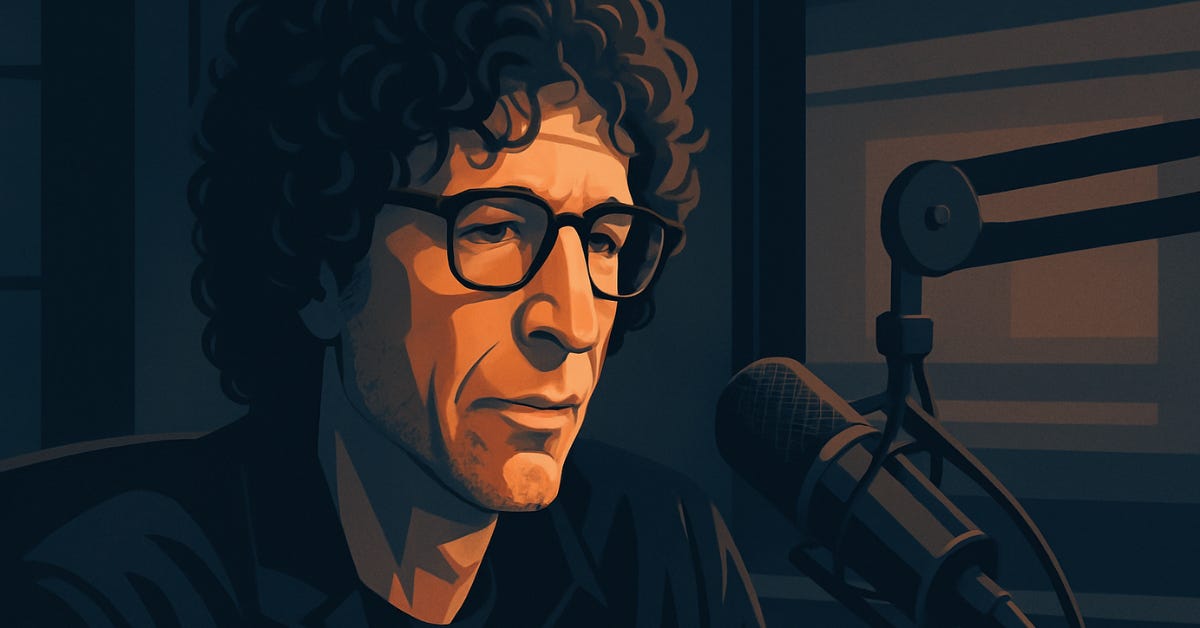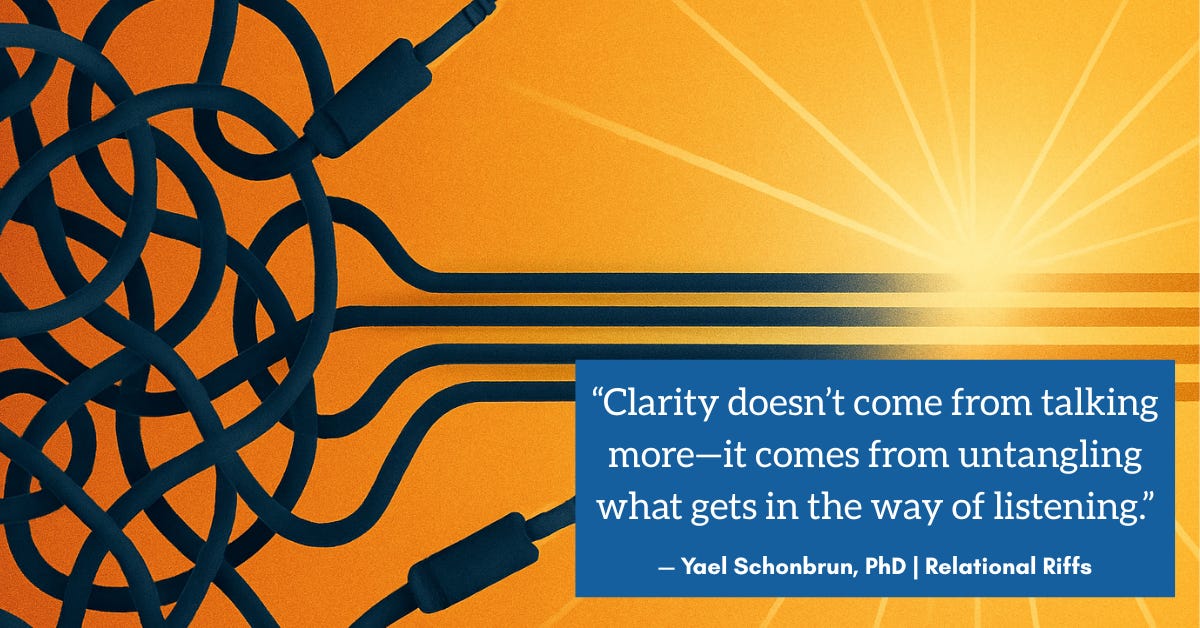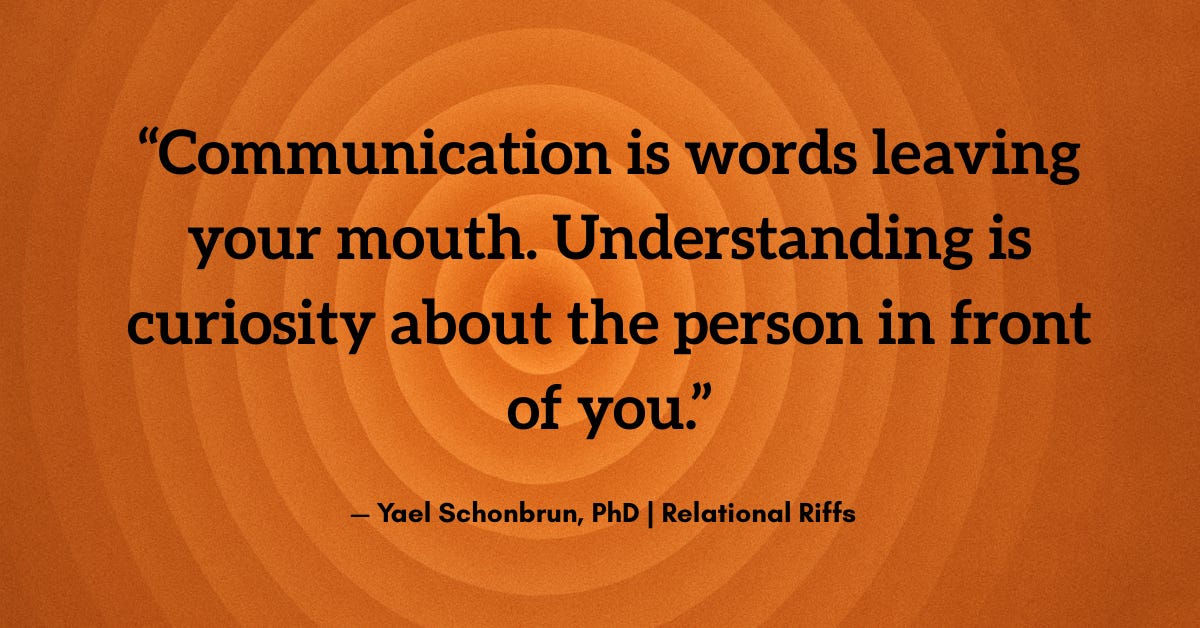Why Communication Isn’t Understanding
What Howard Stern might teach us about listening with genuine curiosity.
On election day, a day when many of us are anxious about being misunderstood (and anxious about those we don’t understand), let’s talk about why communication and understanding are totally different things.
I’ve been on an all-consuming quest to understand the difference for the book I’m working on (out next year!).1 It’s led me to some surprising places: detectives who got confessions from serial killers, letters between Vincent van Gogh and his brother Theo, Anne of Green Gables, octopus teachers, Buddhists, Stoics,2 Carl Rogers.
And also Howard Stern, the guy who once dangled in a Fartman costume at the MTV Video Music Awards.3
I recently read Stern’s book titled (ahem) Howard Stern Comes Again, which includes dozens of interview transcripts and Stern’s commentary. Honestly? Terrific read. Stern has gotten less shocking, much wiser, and infinitely more likable. (Personal growth after 60! There’s hope for us all.)
When Being Understood Changes Everything
Stern’s transformation, as it turns out, came from the therapy room. Being deeply heard as a patient, he writes, changed how he interviewed guests: from skillful-but-disconnected rapid-fire questions to genuine understanding and connection.
In his words:
I had found myself changing my approach because I had experienced what it was like to have someone genuinely interested in my life. Therapy opened me up and enabled me to appreciate how fulfilling it was to be truly heard.
What That Looks Like in Practice
There’s a pretty wild interview Stern did with Steve Rannazzisi, comedian and actor. Rannazzisi had lied about escaping from one of the Twin Towers during 9/11, and when the truth came out, his publicist called Stern’s show. Rannazzisi only wanted to talk to one person: Stern.
It wasn’t easy for Stern to do the interview. He remembered 9/11 vividly, people jumping, friends lost. He had strong feelings about someone who’d lied so extensively about it.
But here’s what Stern saw during their conversation: Rannazzisi was remorseful and in pain. Stern reflected:
He was really suffering. In fact, he’d been suffering before he lied. That’s what caused him to lie in the first place. He’d felt so bad inside that he needed to make something up so that people would like and care about him.
Stern also acknowledged the anger, both his own and his listeners’:
I’ll be honest with you: people still want to end your career and send you hate. People are angry, and I’m angry, too. This is such a horrible thing that happened in our history, and to lie about it seems so wrong. But at the same time, I know you’re a human being. And I know that you probably did not want to hurt anyone. If anything, you were doing this to be accepted.
By the end of the interview:
There are some people who could never forgive. … You know it’s too painful for them, and they don’t understand, and they don’t want to understand.
But, Stern adds that Rannazzisi’s willingness to come on the show and explain could aid in people’s forgiveness. And there was value in that.
Old Stern would have gone for the jugular. Made it entertaining, provocative, maybe even cruel. New Stern chose to understand a fellow human being in pain, even when that person had lied about one of the most traumatic events in recent American history.
Stern’s shift didn’t happen in a vacuum. To understand its significance, it helps to remember who he used to be.
The Empire Built on Meaningless Communication
So let’s rewind for a moment. Before this transformation, Stern had massive success with tactics designed to capture attention—”Bestiality Dial-A-Date” segments, badgering guests about their sex lives, straight-up harassment that invited fans to join in.
Inarguable success. Radio fame. Fortune.
Yet Stern writes:
It wasn’t good radio. It was meaningless. It was just me being self-absorbed and compulsive about asking something that would provoke and antagonize.
He’d mastered communication. He had built an empire on it. But without the desire to truly understand his guests, all that communication was, in his own words, meaningless.
Our minds are wired in ways that make understanding elusive—at least the kind that creates deeper connections, self and other-awareness, learning, and growth.
Our desire to understand gets hijacked by forces we’re barely conscious of. Internal, unconscious processes shape our social perceptions and actively work against the understanding we’re trying to achieve. (My book digs into these processes—probably in too much detail. You’ve been warned.)
Think about that. Even when we want to understand people, when we try, our mental machinery quietly sabotages the effort.
We all know what it’s like to be on the receiving end of that lack of understanding. But we rarely recognize how often we’re the ones perpetuating it.
What Actually Works
The good news: misunderstanding isn’t inevitable. Once we understand the power of really trying to understand others, as well as what hijacks understanding, we can start doing a better job in being understanders.
We can:
Recognize when our understanding gets hijacked (knowledge is power). For instance, notice when you are rehearsing a response instead of trying to understand what the other person is actually saying.
Proactively reduce misunderstanding risk (prevention beats cure). Here, he best tip is to check your overconfidence. Research shows that our confidence we know exceeds our accuracy.
Catch misunderstandings early (and often—because they will happen). Recognizing that you’ll often misunderstand others, which makes you more inclined to check. This gets you confirmation when you’re right and corrective feedback when you’re wrong.
The Real Shift
Stern’s transformation wasn’t about better interview techniques or communication strategies. It was about experiencing genuine interest and presence from the receiving end.
The clinical insight: It’s not as much about communication skills as we often assume. It’s about what communication is trying to accomplish. We need to remember that what we are seeking is understanding and being understood. It’s that experience which protects us against relationship conflict, pain, and even improves intergroup relationships.
Once you’ve experienced understanding—really experienced it—it’s harder to settle for anything less for yourself or others.
The Bottom Line: Communication is words leaving your mouth. Understanding is genuine curiosity about the person in front of you—and the courage to discipline the narcissistic parts that keep pulling focus back to yourself.
Even if you’ve never worn a Fartman costume.
If this resonated with you, hit like—it helps me understand what you want to understand more about.
And if you know someone who needs to hear this (we all know that person who mistakes talking for listening), share it with them. (Gentle intervention?)
I can’t speak for anyone else’s experience in writing a book, but I find that whatever I’m writing about becomes the lens through which I see the world. It’s definitely an “I’m a hammer and the world is my nail” situation. Pretty much everything I see, read, or experience seems to reflect some lesson in understanding misunderstandings.
Newsletters on lessons in understanding from Buddhism and Stoicism to come!
The ‘90s were a lawless time, folks. Also, Luke Perry was a very good sport.






Excited for the book! “Once you’ve experienced understanding—really experienced it—it’s harder to settle for anything less for yourself or others.“ really resonated for me. I’ve been thinking about the emotional presence I provide for my kids how it’s one of the most important things I can offer them. It’s also the thing I often need most in my friendships and my marriage.
What a fascinating read - the way his experience has flipped the understanding of connection is something we can all be more aware of. I'm definitely guilty of the mental self-sabotage.